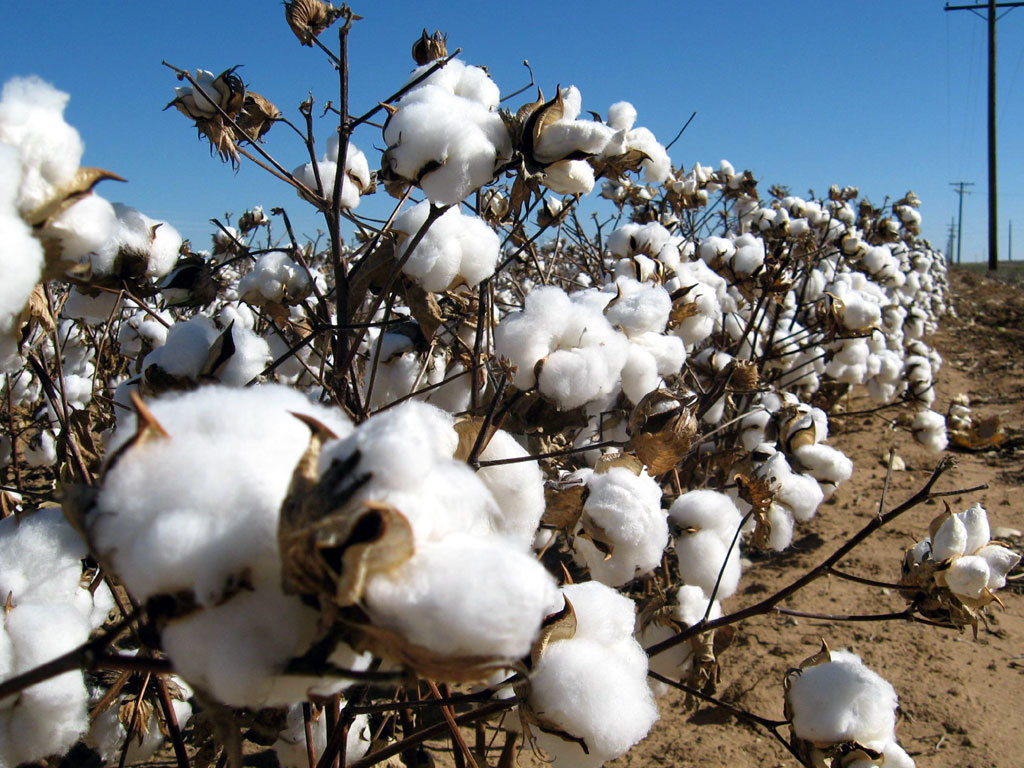Haji Muhammad Abdullah Talpur, a progressive cotton grower of South Punjab, is planning to stop growing cotton this year due to government policies. Busy harvesting wheat, he has decided to grow sunflower and chillies instead of cotton.
Talpur has been growing cotton, white gold for him once, since the 90s. But now it has lost its charm, having become unprofitable.
It is alarming to see that hundreds of thousands cotton growers like Talpur have either switched or are switching to other crops – initial- ly to sugarcane and later on to maize, chilies and sunflower in Punjab and Sindh.
Cotton has been a lucrative cash crop for many years between 1990 and 2010. Cotton production has been sufficient for the country needs. Being a major cash crop of Pakistan, cotton is considered the backbone of the economy. It contributes about 0.8 percent to GDP and 4.1 percent of total value addition in agriculture.
Senator Syed Muzaffar Hussain Shah, former Chief Minister Sindh, used to grow cotton over about a thousand acres every year but due to unfavourable conditions he is considering to reduce cotton cultivation to diversify and eventually switch over to other crops like maize, chilies and rice in District Umerkot Sindh.
Talking with The Truth International, the former chairman Pakistan Cotton Ginners Association Dr Jassumal said: “Some 5.6 million bales have arrived in the market till now and it is expected that there will be no more arrivals. The country will face a shortfall of 9 to 10 million bales and it will cost the national exchequer about USD 3 to 4 billion”.
Due to the government policies, cotton production is at 30 years low this year. According to Ministry of National Food Security and Research, cotton production is estimated at 6 million bales and the industrial demand is about 14 million bales.
Dr Jassumal says some 800 ginning factories have been closed in the country due to government policies. During the last one decade or so, the number of ginning factories has shrunk from 1200 to 400 in Pakistan.
In 2004-5 cotton production was 14.2 million bales and it has been floating around 10 to 12 million bales a year till 2017. The country has recorded a sharp dwindle in cotton production during the last three years which is a bad omen for the economy of Pakistan.
Cotton cultivation area has decreased from 2.86 million hectares in 2011 to 2.48 million hectares in 2020. The area devoted to cotton is projected to lessen by 12 percent in the current fiscal year 2020-21.
During the last one decade, powerful sugar and textile lobbies have formulated policies in a way which lead to suppressing the cotton cultivation and production in the country. Last year, the lobbies succeeded in abolishing the government-fixed minimum support price for cotton.
Federal Minister Syed Fakhar Imam tried to agitate the matter at the Cabinet level but the powerful textile industry lobbies staunched the move.
While talking to The Truth International Magazine (TTI), Senator Syed Muzaffar Hussain Shah said that “Government has not fixed the minimum support price for cotton which has led to a fall in production of cotton at a historic low.
“The government should intervene to revive the cotton industry. Fair assessment for cost of production should be done to fix minimum support price of cotton, at least they should be given an assurance that their cost will recovered”, he added.
Syed Muzaffar Hussain Shah says that the cropping pattern is changing in Punjab and Sindh. Due to the lack of minimum support price formers are shifting towards maize and sugarcane.
Cotton production sharply decreased this year because of unfavour- able weather conditions and pest attacks. Other reasons of the decline in cotton production include drought, seed degradation, and reduction of planting area.
Sugarcane is encroaching over cotton area is yet another reason for fall of cotton production.
Syed Muzaffar Hussain Shah says Textile mills have a strong lobby in the power corridors which is formulating the policies.
Former Advisor to the Finance Ministry, Dr Khaqan Najeeb said the area under cultivation of cotton in FY21 dropped to just a little over 2.2 million hectares, which was the lowest on record since FY82. To some extent the decline in area was taken over by rice & sugarcane.
Dr Khaqan says area under cotton has seen a steady decline over the past decade, bringing the annual average over the decade down to 2.7 million hectares compared to 3 million hectares in the previous decade.
The seed regulatory body is ineffective to the extent that last year it allowed marketing of seeds to the farmers with high germination levels of 55 percent. These defective seeds played a role in reducing the plant population by half.
The government has failed to collect Cotton Cess from the textile mill owner. As a result, no funds are available for research and development. Levy of Cotton Cess stands at PKR 50 per bale of raw cotton exported or consumed by the domestic textile industry.
Due to a lack of funds for research and development, no new seeds verities, pest control, or crop management technologies have been developed during the last two decade after introduction of BT cotton, an insect-resistant transgenic crop designed to combat the bollworm, in 2001, but now the seed has lost its genetic superiority.
Dr Khaqan says falling yields have resulted in the third yearly decline of cotton production in FY21. Cotton is losing its competitive edge over other crops especially sugar cane. A revival of cotton production based on productivity revival is essential, he adds.
He is of the opinion that the introduction and enforcement of the amended Seed Act and the Plant Breeder’s Rights Act 2015 is essential to fully modernizing the sector by providing necessary intellectual property protection and effectively curbing the supply and usage of adulterated cotton seed.










